外研版(2019)必修第一册Unit 5 Into the wild Language points(42张PPT)
文档属性
| 名称 | 外研版(2019)必修第一册Unit 5 Into the wild Language points(42张PPT) |  | |
| 格式 | zip | ||
| 文件大小 | 1.3MB | ||
| 资源类型 | 教案 | ||
| 版本资源 | 外研版(2019) | ||
| 科目 | 英语 | ||
| 更新时间 | 2022-07-11 14:18:04 | ||
图片预览

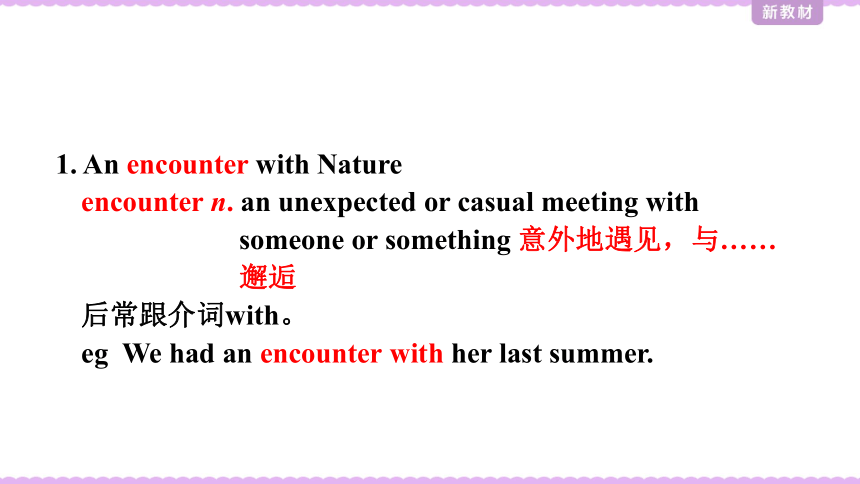


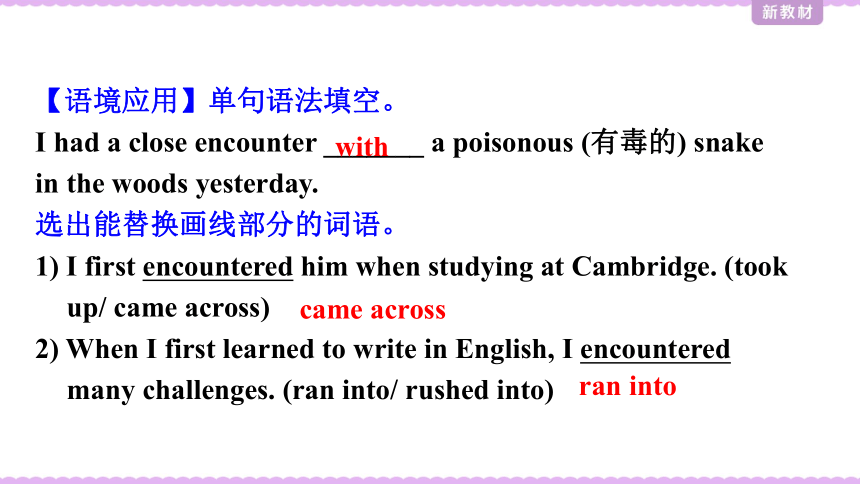
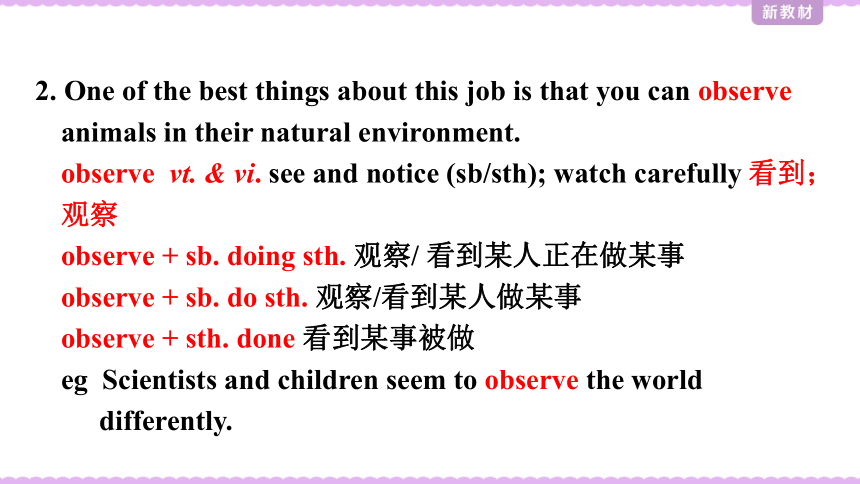
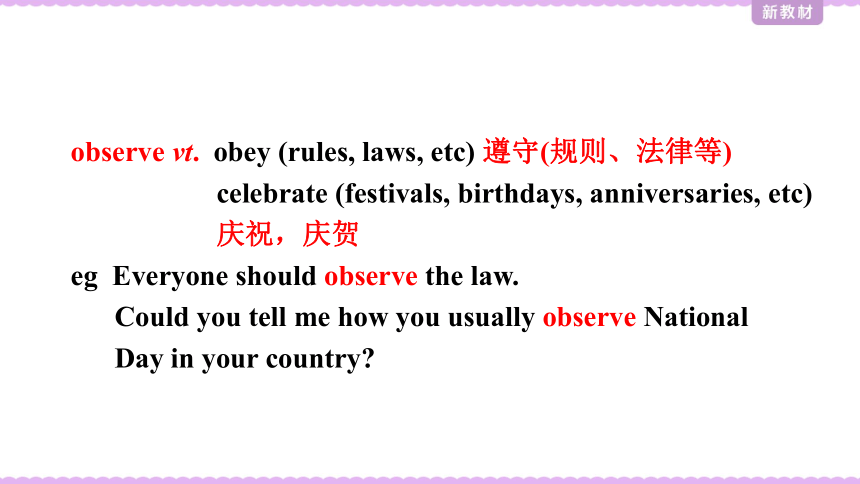
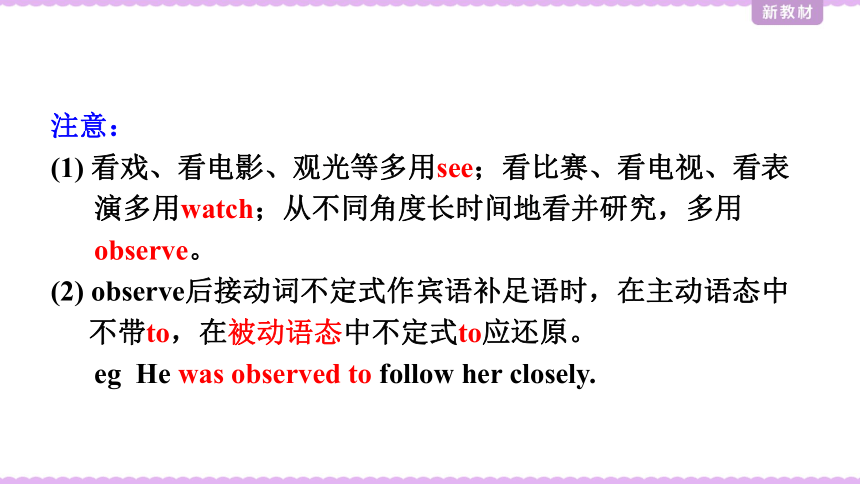
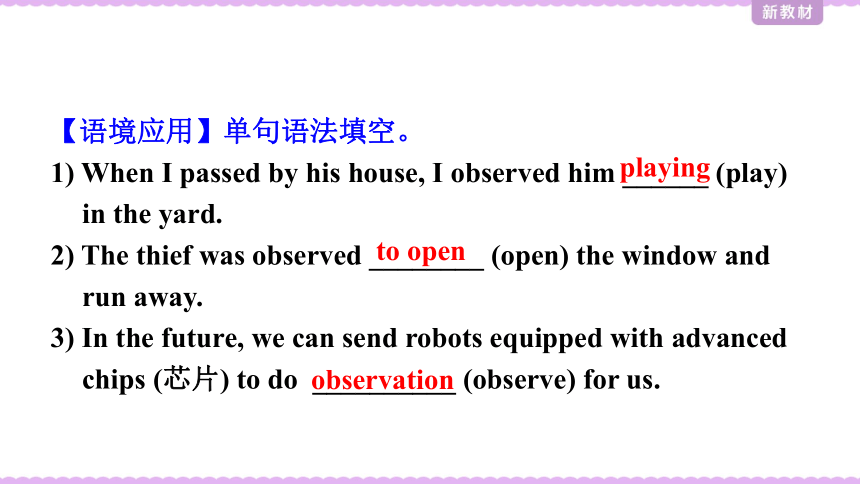
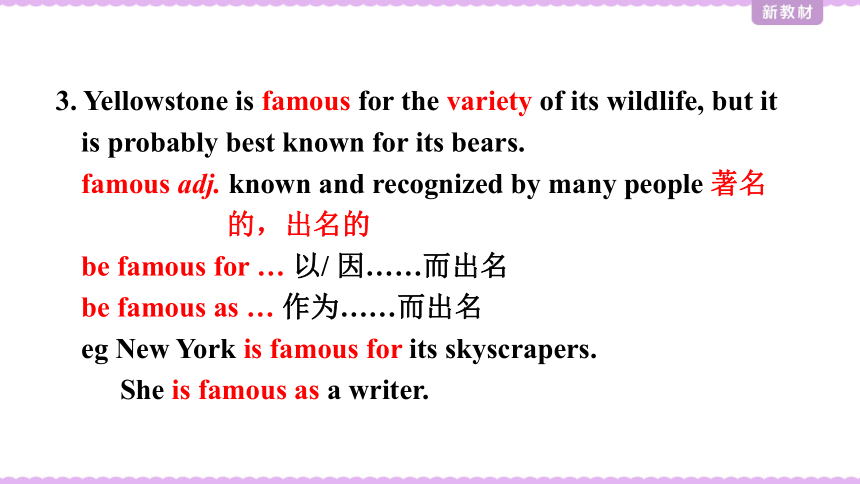

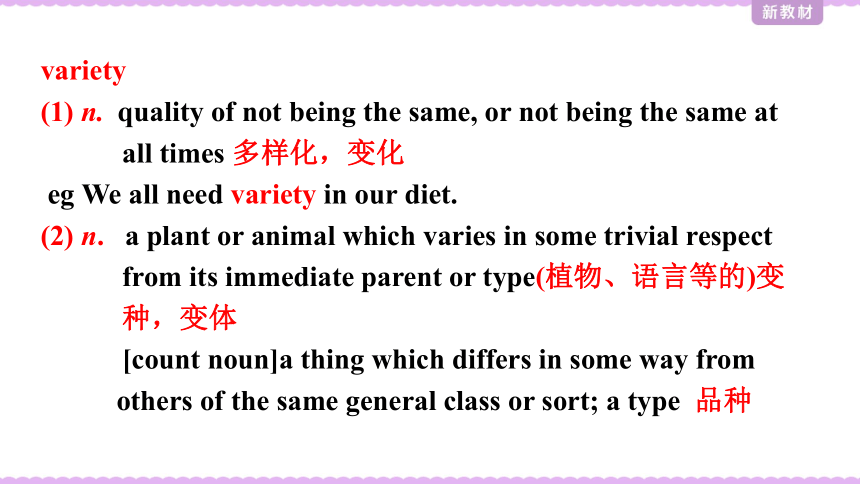
文档简介
(共42张PPT)
1. An encounter with Nature
encounter n. an unexpected or casual meeting with someone or something 意外地遇见,与……邂逅
后常跟介词with。
eg We had an encounter with her last summer.
vt. meet (someone) unexpectedly 意外地遇见,偶然碰到,与……邂逅
meet unexpectedly and confront (an adversary) 遭遇,遇到(尤指令人不快或困难的事)
encounter problems/ difficulties 遇到问题/困难
eg She encountered an old friend on her way home
Although we encountered so many problems in our work, we never gave up.
表示“偶然碰到”的短语还有: come across, run across, run into
表示“遇到(困难)”的短语还有:run into, meet with
【语境应用】单句语法填空。
I had a close encounter _______ a poisonous (有毒的) snake in the woods yesterday.
选出能替换画线部分的词语。
1) I first encountered him when studying at Cambridge. (took up/ came across)
2) When I first learned to write in English, I encountered many challenges. (ran into/ rushed into)
with
came across
ran into
2. One of the best things about this job is that you can observe animals in their natural environment.
observe vt. & vi. see and notice (sb/sth); watch carefully 看到;观察
observe + sb. doing sth. 观察/ 看到某人正在做某事
observe + sb. do sth. 观察/看到某人做某事
observe + sth. done 看到某事被做
eg Scientists and children seem to observe the world differently.
observe vt. obey (rules, laws, etc) 遵守(规则、法律等)
celebrate (festivals, birthdays, anniversaries, etc) 庆祝,庆贺
eg Everyone should observe the law.
Could you tell me how you usually observe National Day in your country
注意:
(1) 看戏、看电影、观光等多用see;看比赛、看电视、看表演多用watch;从不同角度长时间地看并研究,多用observe。
(2) observe后接动词不定式作宾语补足语时,在主动语态中不带to,在被动语态中不定式to应还原。
eg He was observed to follow her closely.
【语境应用】单句语法填空。
1) When I passed by his house, I observed him ______ (play) in the yard.
2) The thief was observed ________ (open) the window and run away.
3) In the future, we can send robots equipped with advanced chips (芯片) to do __________ (observe) for us.
playing
to open
observation
3. Yellowstone is famous for the variety of its wildlife, but it is probably best known for its bears.
famous adj. known and recognized by many people 著名的,出名的
be famous for … 以/ 因……而出名
be famous as … 作为……而出名
eg New York is famous for its skyscrapers.
She is famous as a writer.
【语境应用】用适当的介词填空。
1) Winston Churchill is well – known _____ a statesman and ______ the British Prime Minister during most of the Second World War. He is especially famous ______ his speeches which many believe made people even more determined to defeat the enemy.
2) The city is known ______ the world _____ its long history and ancient culture.
as
as
for
to
for
variety
(1) n. quality of not being the same, or not being the same at all times 多样化,变化
eg We all need variety in our diet.
(2) n. a plant or animal which varies in some trivial respect from its immediate parent or type(植物、语言等的)变种,变体
[count noun]a thing which differs in some way from others of the same general class or sort; a type 品种
the variety of ……的种类
a (wide) variety of / varieties of 各种各样的
eg I was impressed by the variety of dishes on offer.
A wide variety of flowers were on show in the street.
various adj. 各种不同的,各种各样的
vary vi. 相异;变化,变更
vary from…to… 从……到……不等
vary with… 随……变化而变化
vary in… 在……方面相异/不同
eg Customs vary greatly from country to country.
Prices vary with the type of room you require.
【语境应用】完成句子。
1) He resigned for ___________________________________.
他由于种种原因辞职了。
2) A variety of his books _________________ in recent years.
近几年他各种各样的书被出版了。
various/ a variety of/ varieties of reasons
have been published
4. Despite a weight of up to 300 kilograms, they can run at a speed of around 64 kilometres per hour and are also excellent swimmers.
despite prep. without being affected by; in spite of 虽然, 尽管;其后可接名词(短语)或动词-ing形式。
eg I still enjoyed the week despite the weather.
Despite applying for hundreds of jobs, he is still out of work.
despite和although都意为“尽管,虽然”,但用法不同。
despite prep.与名词(短语)或v-ing形式连用,作状语;
although conj. 引导状语从句
原句可转化为:
Although the bears weigh up to 300 kilograms, they can run at a speed of around 64 kilometres per hour…
despite意思上相当于in spite of (尽管)。
despite / in spite of 后跟句子时,常用结构despite / in spite of the fact that ...尽管…… that后跟同位语从句。
eg She went to Spain in spite of / despite the fact that her doctor had told her to rest.
in spite of / despite oneself 不由自主地
eg In spite of / Despite myself, I began to enjoy the movie.
【语境应用】汉译英。
1) 虽然我昨天生病了,我还是去了学校。
In spite of / Despite the fact that I was ill, I still went to school yesterday.
Although I was ill, I still went to school yesterday.
In spite of / Despite my illness, I still went to school yesterday.
2) 他太累了,不由自主地睡着了。
He was very tired and fell asleep in spite of / despite himself.
5. While I was concentrating on photographing this amazing scene, I suddenly had a feeling that I was being watched.
concentrate on: to give most of your attention or effort to one thing 全神贯注
concentrate one’s efforts/ attention on 集中精力/注意力于……
eg Doctors are aiming to concentrate more on prevention than cure.
“全神贯注于……”的其他表达:
focus on
focus/ fix one’s mind/ attention on
put one’s heart into
be absorbed/ buried/ lost in
devote oneself to= be devoted to (to是介词)
concentrate v. 专注,专心;(使)集中于
Concentration n. 集中;专心
【语境应用】单句语法填空。
1) I’m concentrating my efforts ________ preparing for tomorrow’s exam.
2) Stress and tiredness often result in a lack of ___________ (concentrate).
3) With his attention ___________ (concentrate) on a book, he didn’t notice me come in.
on
concentration
concentrated
本句中that I was being watched为连接词that引导的同位语从句,说明feeling的具体内容。
that引导的同位语从句多位于idea, fact, evidence, hope, belief, wish, doubt, news, advice, suggestion, promise等包含一定内容的抽象名词后面,对这个名词进行解释说明。
eg The news that he won the game excited us a lot.
I received a message that she would be late.
6. With water falling off its thick, brown hair, the bear stared back at me.
with water falling off its thick, brown hair是with复合结构,在句中作状语,此处是现在分词短语falling off its thick, brown hair作宾补。
with复合结构构成:with+ 宾语+ 宾补
常在句中作状语,表示时间、原因、方式、条件或伴随等,也可以作定语。具体形式主要有:
(1) with+ 宾语+ 现在分词(表示主动或正在进行)
eg The weather was even colder with the wind blowing.
(2) with +宾语+过去分词(表示被动或已经完成)
eg With his work finished, he gladly accepted the invitation to dinner.
(3) with + 宾语+ 动词不定式 (表示尚未发生)
eg With so much work to do, I can’t go on holiday.
(4) with + 宾语+ 形容词
eg He slept in the chair with the door open.
(5) with+ 宾语+ 副词
eg She left in a hurry, with all the lights on.
(6) with + 宾语+ 介词短语
eg He came in, with a musical instrument in his hand.
【语境应用】单句语法填空。
1) With all the work ________ (finish), they hurried back home for lunch.
2) With a lot of homework _______ (do), I can’t go skating with you.
3) The teacher came in with some students _________ (follow) him.
finished
to do
following
4) A young lady came up to me _________ some literature books in her hand.
5) The old man walked in with a stick ______ his hand.
6) We completely solved the problem with many scientific methods ______ (use).
with
in
used
7. When I recovered from the shock, I looked at my camera.
recover v. return to a normal state of health, mind, or strength (从糟糕经历中)恢复
(be recovered)(of a person) be well again 康复
to get back; regain. 重新获得
sth (from sb/sth) find again (sth stolen, lost, etc); regain possession of sth 找回
recover from 从……中恢复
recover oneself 静下心来
eg The boy is gradually recovering from his heart operation.
It will be at least three months before he can recover and return to work.
He lost his suitcase, but he recovered it at the railway station.
recovery n. 恢复;康复;复得,找回
make a full recovery 完全康复
make a quick/ slow recovery 恢复快/ 缓慢
【语境应用】单句语法填空。
1) She recovered ______ her surprise, and answered calmly.
2) He’s in hospital, __________ (recover) from a heart attack.
3) To his parents’ relief, the boy made a quick _________ (recover) after the operation.
4) Hospital patients who see tree branches out their window are likely __________________ (recover) at a faster rate than patients who see buildings or sky instead.
from
recovering
recovery
haven’t recovered
shock n. a sudden, unexpected and usually unpleasant event or experience 吃惊,震惊;令人震惊的事
a medical condition caused by severe injury, pain, loss of blood or fear which slows down the flow of blood around the body 休克
v. to make someone feel upset or surprised 使震惊,使惊愕
be in a state of shock 惊魂未定;处于休克状态
give sb. a shock 使某人震惊
come as a shock 非常震惊
It shocks sb. to see/ hear … 看到/ 听到……使某人震惊
shocking adj. 令人震惊的
shocked adj. 震惊的
be shocked at/ by对……感到震惊
be shocked to see/ hear… 震惊地看到/ 听到……
a shocked look/ expression/ voice 震惊的表情/声音
【语境应用】完成句子。
1) After the crash, most of the passengers _________________ ________(从震惊中恢复过来), staring at each other.
2) The parents __________________ (对……感到震惊) the news that their son needed an operation on his knee.
recovered from the shock
were shocked at/ by
8. It is after all we who are the visitors to their world.
after all In spite of everything to the contrary; nevertheless 毕竟
Everything else having been considered; ultimately 终究
表示结果与预想的不同,常置于句末
eg Why are you so anxious It isn’t your problem after all.
I thought I would fail the exam, but I passed after all.
nevertheless;in spite of what has happened 到底,别忘了(解释或说明理由)
eg It’s not surprising that the boy got a stomachache. After all, he had eaten too much.
其他与all有关的短语:
all in all 总的说来,从各方面考虑
in all 总共,共计
above all 最重要的是,尤其是(强调重要性)
first of all 首先,第一(强调顺序)
【语境应用】用all 的相关短语完成句子。
1) Children need many things, but __________they need love.
2) I am glad to join you in playing this game, but __________ please allow me to introduce myself to you.
3) These things cost $ 3000 ______, which was beyond belief.
4) The opening ceremony isn’t so good, but _________ I consider in a success.
5) Bob thought he couldn’t go to the party because he had to write a report, but he went __________.
above all
first of all
in all
all in all
after all
2) It is/was … who/that …结构表强调,被强调部分指人时用who 或that,指物时用that。
注意:
①被强调部分若是句子的主语,that / who 之后的谓语动词的数与句子的主语保持一致。
②被强调部分若是时间状语或地点状语,应用that,而不是when或where。
eg It is I who am to blame for the carelessness.
It was at six o’clock that the accident happened.
1. An encounter with Nature
encounter n. an unexpected or casual meeting with someone or something 意外地遇见,与……邂逅
后常跟介词with。
eg We had an encounter with her last summer.
vt. meet (someone) unexpectedly 意外地遇见,偶然碰到,与……邂逅
meet unexpectedly and confront (an adversary) 遭遇,遇到(尤指令人不快或困难的事)
encounter problems/ difficulties 遇到问题/困难
eg She encountered an old friend on her way home
Although we encountered so many problems in our work, we never gave up.
表示“偶然碰到”的短语还有: come across, run across, run into
表示“遇到(困难)”的短语还有:run into, meet with
【语境应用】单句语法填空。
I had a close encounter _______ a poisonous (有毒的) snake in the woods yesterday.
选出能替换画线部分的词语。
1) I first encountered him when studying at Cambridge. (took up/ came across)
2) When I first learned to write in English, I encountered many challenges. (ran into/ rushed into)
with
came across
ran into
2. One of the best things about this job is that you can observe animals in their natural environment.
observe vt. & vi. see and notice (sb/sth); watch carefully 看到;观察
observe + sb. doing sth. 观察/ 看到某人正在做某事
observe + sb. do sth. 观察/看到某人做某事
observe + sth. done 看到某事被做
eg Scientists and children seem to observe the world differently.
observe vt. obey (rules, laws, etc) 遵守(规则、法律等)
celebrate (festivals, birthdays, anniversaries, etc) 庆祝,庆贺
eg Everyone should observe the law.
Could you tell me how you usually observe National Day in your country
注意:
(1) 看戏、看电影、观光等多用see;看比赛、看电视、看表演多用watch;从不同角度长时间地看并研究,多用observe。
(2) observe后接动词不定式作宾语补足语时,在主动语态中不带to,在被动语态中不定式to应还原。
eg He was observed to follow her closely.
【语境应用】单句语法填空。
1) When I passed by his house, I observed him ______ (play) in the yard.
2) The thief was observed ________ (open) the window and run away.
3) In the future, we can send robots equipped with advanced chips (芯片) to do __________ (observe) for us.
playing
to open
observation
3. Yellowstone is famous for the variety of its wildlife, but it is probably best known for its bears.
famous adj. known and recognized by many people 著名的,出名的
be famous for … 以/ 因……而出名
be famous as … 作为……而出名
eg New York is famous for its skyscrapers.
She is famous as a writer.
【语境应用】用适当的介词填空。
1) Winston Churchill is well – known _____ a statesman and ______ the British Prime Minister during most of the Second World War. He is especially famous ______ his speeches which many believe made people even more determined to defeat the enemy.
2) The city is known ______ the world _____ its long history and ancient culture.
as
as
for
to
for
variety
(1) n. quality of not being the same, or not being the same at all times 多样化,变化
eg We all need variety in our diet.
(2) n. a plant or animal which varies in some trivial respect from its immediate parent or type(植物、语言等的)变种,变体
[count noun]a thing which differs in some way from others of the same general class or sort; a type 品种
the variety of ……的种类
a (wide) variety of / varieties of 各种各样的
eg I was impressed by the variety of dishes on offer.
A wide variety of flowers were on show in the street.
various adj. 各种不同的,各种各样的
vary vi. 相异;变化,变更
vary from…to… 从……到……不等
vary with… 随……变化而变化
vary in… 在……方面相异/不同
eg Customs vary greatly from country to country.
Prices vary with the type of room you require.
【语境应用】完成句子。
1) He resigned for ___________________________________.
他由于种种原因辞职了。
2) A variety of his books _________________ in recent years.
近几年他各种各样的书被出版了。
various/ a variety of/ varieties of reasons
have been published
4. Despite a weight of up to 300 kilograms, they can run at a speed of around 64 kilometres per hour and are also excellent swimmers.
despite prep. without being affected by; in spite of 虽然, 尽管;其后可接名词(短语)或动词-ing形式。
eg I still enjoyed the week despite the weather.
Despite applying for hundreds of jobs, he is still out of work.
despite和although都意为“尽管,虽然”,但用法不同。
despite prep.与名词(短语)或v-ing形式连用,作状语;
although conj. 引导状语从句
原句可转化为:
Although the bears weigh up to 300 kilograms, they can run at a speed of around 64 kilometres per hour…
despite意思上相当于in spite of (尽管)。
despite / in spite of 后跟句子时,常用结构despite / in spite of the fact that ...尽管…… that后跟同位语从句。
eg She went to Spain in spite of / despite the fact that her doctor had told her to rest.
in spite of / despite oneself 不由自主地
eg In spite of / Despite myself, I began to enjoy the movie.
【语境应用】汉译英。
1) 虽然我昨天生病了,我还是去了学校。
In spite of / Despite the fact that I was ill, I still went to school yesterday.
Although I was ill, I still went to school yesterday.
In spite of / Despite my illness, I still went to school yesterday.
2) 他太累了,不由自主地睡着了。
He was very tired and fell asleep in spite of / despite himself.
5. While I was concentrating on photographing this amazing scene, I suddenly had a feeling that I was being watched.
concentrate on: to give most of your attention or effort to one thing 全神贯注
concentrate one’s efforts/ attention on 集中精力/注意力于……
eg Doctors are aiming to concentrate more on prevention than cure.
“全神贯注于……”的其他表达:
focus on
focus/ fix one’s mind/ attention on
put one’s heart into
be absorbed/ buried/ lost in
devote oneself to= be devoted to (to是介词)
concentrate v. 专注,专心;(使)集中于
Concentration n. 集中;专心
【语境应用】单句语法填空。
1) I’m concentrating my efforts ________ preparing for tomorrow’s exam.
2) Stress and tiredness often result in a lack of ___________ (concentrate).
3) With his attention ___________ (concentrate) on a book, he didn’t notice me come in.
on
concentration
concentrated
本句中that I was being watched为连接词that引导的同位语从句,说明feeling的具体内容。
that引导的同位语从句多位于idea, fact, evidence, hope, belief, wish, doubt, news, advice, suggestion, promise等包含一定内容的抽象名词后面,对这个名词进行解释说明。
eg The news that he won the game excited us a lot.
I received a message that she would be late.
6. With water falling off its thick, brown hair, the bear stared back at me.
with water falling off its thick, brown hair是with复合结构,在句中作状语,此处是现在分词短语falling off its thick, brown hair作宾补。
with复合结构构成:with+ 宾语+ 宾补
常在句中作状语,表示时间、原因、方式、条件或伴随等,也可以作定语。具体形式主要有:
(1) with+ 宾语+ 现在分词(表示主动或正在进行)
eg The weather was even colder with the wind blowing.
(2) with +宾语+过去分词(表示被动或已经完成)
eg With his work finished, he gladly accepted the invitation to dinner.
(3) with + 宾语+ 动词不定式 (表示尚未发生)
eg With so much work to do, I can’t go on holiday.
(4) with + 宾语+ 形容词
eg He slept in the chair with the door open.
(5) with+ 宾语+ 副词
eg She left in a hurry, with all the lights on.
(6) with + 宾语+ 介词短语
eg He came in, with a musical instrument in his hand.
【语境应用】单句语法填空。
1) With all the work ________ (finish), they hurried back home for lunch.
2) With a lot of homework _______ (do), I can’t go skating with you.
3) The teacher came in with some students _________ (follow) him.
finished
to do
following
4) A young lady came up to me _________ some literature books in her hand.
5) The old man walked in with a stick ______ his hand.
6) We completely solved the problem with many scientific methods ______ (use).
with
in
used
7. When I recovered from the shock, I looked at my camera.
recover v. return to a normal state of health, mind, or strength (从糟糕经历中)恢复
(be recovered)(of a person) be well again 康复
to get back; regain. 重新获得
sth (from sb/sth) find again (sth stolen, lost, etc); regain possession of sth 找回
recover from 从……中恢复
recover oneself 静下心来
eg The boy is gradually recovering from his heart operation.
It will be at least three months before he can recover and return to work.
He lost his suitcase, but he recovered it at the railway station.
recovery n. 恢复;康复;复得,找回
make a full recovery 完全康复
make a quick/ slow recovery 恢复快/ 缓慢
【语境应用】单句语法填空。
1) She recovered ______ her surprise, and answered calmly.
2) He’s in hospital, __________ (recover) from a heart attack.
3) To his parents’ relief, the boy made a quick _________ (recover) after the operation.
4) Hospital patients who see tree branches out their window are likely __________________ (recover) at a faster rate than patients who see buildings or sky instead.
from
recovering
recovery
haven’t recovered
shock n. a sudden, unexpected and usually unpleasant event or experience 吃惊,震惊;令人震惊的事
a medical condition caused by severe injury, pain, loss of blood or fear which slows down the flow of blood around the body 休克
v. to make someone feel upset or surprised 使震惊,使惊愕
be in a state of shock 惊魂未定;处于休克状态
give sb. a shock 使某人震惊
come as a shock 非常震惊
It shocks sb. to see/ hear … 看到/ 听到……使某人震惊
shocking adj. 令人震惊的
shocked adj. 震惊的
be shocked at/ by对……感到震惊
be shocked to see/ hear… 震惊地看到/ 听到……
a shocked look/ expression/ voice 震惊的表情/声音
【语境应用】完成句子。
1) After the crash, most of the passengers _________________ ________(从震惊中恢复过来), staring at each other.
2) The parents __________________ (对……感到震惊) the news that their son needed an operation on his knee.
recovered from the shock
were shocked at/ by
8. It is after all we who are the visitors to their world.
after all In spite of everything to the contrary; nevertheless 毕竟
Everything else having been considered; ultimately 终究
表示结果与预想的不同,常置于句末
eg Why are you so anxious It isn’t your problem after all.
I thought I would fail the exam, but I passed after all.
nevertheless;in spite of what has happened 到底,别忘了(解释或说明理由)
eg It’s not surprising that the boy got a stomachache. After all, he had eaten too much.
其他与all有关的短语:
all in all 总的说来,从各方面考虑
in all 总共,共计
above all 最重要的是,尤其是(强调重要性)
first of all 首先,第一(强调顺序)
【语境应用】用all 的相关短语完成句子。
1) Children need many things, but __________they need love.
2) I am glad to join you in playing this game, but __________ please allow me to introduce myself to you.
3) These things cost $ 3000 ______, which was beyond belief.
4) The opening ceremony isn’t so good, but _________ I consider in a success.
5) Bob thought he couldn’t go to the party because he had to write a report, but he went __________.
above all
first of all
in all
all in all
after all
2) It is/was … who/that …结构表强调,被强调部分指人时用who 或that,指物时用that。
注意:
①被强调部分若是句子的主语,that / who 之后的谓语动词的数与句子的主语保持一致。
②被强调部分若是时间状语或地点状语,应用that,而不是when或where。
eg It is I who am to blame for the carelessness.
It was at six o’clock that the accident happened.
